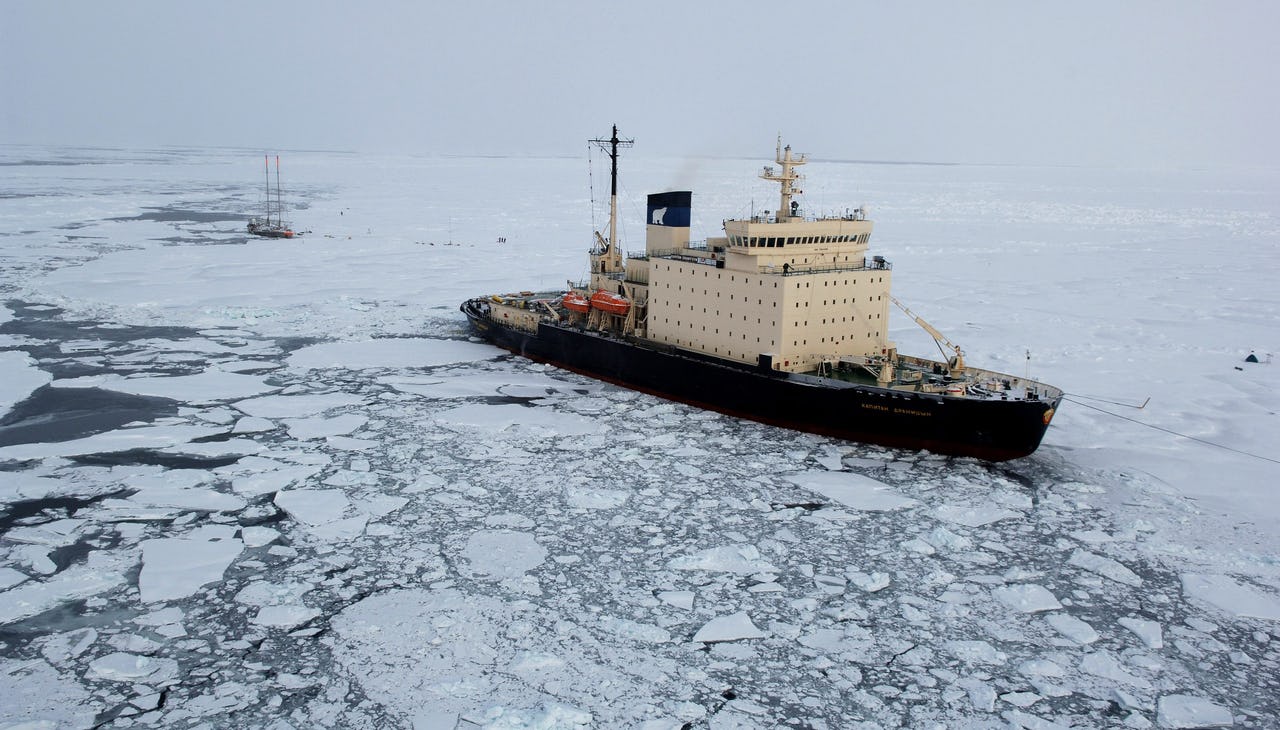Existential Security: Lessons from the Pandemic and the Arctic

Russian icebreaker and research vessel Kapitan Dranitsyn in the Arctic Ocean, north of western Russia in September 2006. Photo: NOAA Climate Program Office
We live in an existential security world due to global warming. The coronavirus pandemic gives us a taste of the new security context. The pandemic has affected all aspects of human life globally–institutions, economies, and social relations. It has shown fragile supply chains and how very quickly life changes for people. It has killed. Unlike the pandemic, existential security from climate change is connected to multiple planetary-wide environmental changes that come at various speeds and create feedback loops at multiple scales of time and place. It no longer matters whether humans caused it, it matters how we cope.
As with the pandemic, no one is really ready. International cooperation, while good, proved unable to stop the spread of COVID-19 partly due to fears over economic consequences. “We can’t afford it’ arguments to act on the Coronavirus look ridiculous now. The coming surprises from global change will be less familiar than facing a pandemic, but “not affording” responses in the Arctic hints at the myriad of challenges and strategies that can be employed to get started on coping, rather than wishful thinking.
It is hard to imagine any Arctic topic that is not entangled with existential security. All the Arctic states need port facilities, but shorelines are dropping into the ocean and people need to move. In parts of Russia and Canada, the coastline erodes an average three to ten meters per year. Permafrost melt bedevils work of all kinds and demands new ideas for infrastructure. Remote Indigenous communities discuss what to do as their villages slip away and make hard choices–choices that make today’s “distancing” and social isolation look pleasant.
Existential security undermines military forms of national security. The newly reformed 2nd Fleet of the Navy is homeported in Newport, Virgina, but it is supposed to protect national security interests in the Arctic. Sometimes the roads to the ships in Virginia are flooded. Port facilities will not get better in most parts of the world, though Russia sees possibilities for its Arctic coast. Thus Navy ships may not be able to sail to protect the Arctic.
Human security, often far less stable than national security, suffers. Coast Guards also need ports to do their jobs. Arctic communities need to move due to rising seas, but lack budgets or socio-technological solutions to staying close to former homes. How to move is not clear at all. To help finance moves of communities, the United States could cut, say, Blackhawk helicopters that cost about $10 million each in 2015. Tradeoffs between national and human security will likely be essential.Moving communities has other existential security impacts. Culture will be lost, knowledge and “placeness” disrupted. While it is good to move in large numbers if the community must leave, people will be largely socially isolated long beyond the moving day. They will face new lives far from former homes.
Arctic experiences suggest likely strategies to cope with what is to come. The Arctic Council may be an early version of an existential security institution (ESI). It helps that Arctic states are wealthy and strong and that their sovereign territories and their citizens are at stake, but the pandemic shows how those factors may not operate as expected. Each Arctic state has regional governments and municipalities that can respond to and act directly on and with people and places in the Arctic. These subnational units are working fairly well in the Arctic and in the pandemic. The Arctic Council actively includes participation by circumpolar Indigenous peoples and participation by other global players. Many Arctic states and local communities or groups actively seek ways to use new technologies, notably crossing the digital divide from little or none to connected.1)
Other institutions, notably through the market, may promote security by what they will not do. As of December 2019 and February 2020, Goldman Sachs and JP Morgan respectively will no longer fund new oil and gas projects in the Arctic. The on-going natural experiment in how nations address the pandemic through government spending may show better and worse ways to support markets. Similarly, firms and governments physically located far from the Arctic may now better understand the experience of lacking supply chains in the Arctic. Introducing greater diversity and delivery modes will facilitate ‘coping’ for people and the economies in which they live.
Three approaches commend themselves for life amidst existential security; all are partly operational in the Arctic, none fully. First, a focus on human security is more likely to soften the blows from existential security: how people live and keep and develop their cultures. Using local expert knowledge may create new options, especially if connected to the larger world of expertise. Second, exploring historic practices and technologies for particular places and conditions will provide agency to people and expand our understanding of relationships. Technological connectivity can spread the ideas. That means more use of Indigenous traditions and ancestral knowledge, from healthcare to ecosystems. Third, in choosing a coping action, choose the one most likely to yield increasing gains to both nature and people.
The pandemic must be addressed in the here and now through new strategies, sharing, and tough decisions. Global warming, so apparent in the Arctic, will need even more vigorous action. The world has a chance to adjust to the long-term warming reality. Ignoring the evidence and ideas for people on the front lines of our warmer world is not an option.
Mary Durfee is Professor Emerita, Michigan Technological University and co-author with Prof. Rachael Lorna Johnstone, University of Akureyri, Iceland, of Arctic Governance in a Changing World.
References